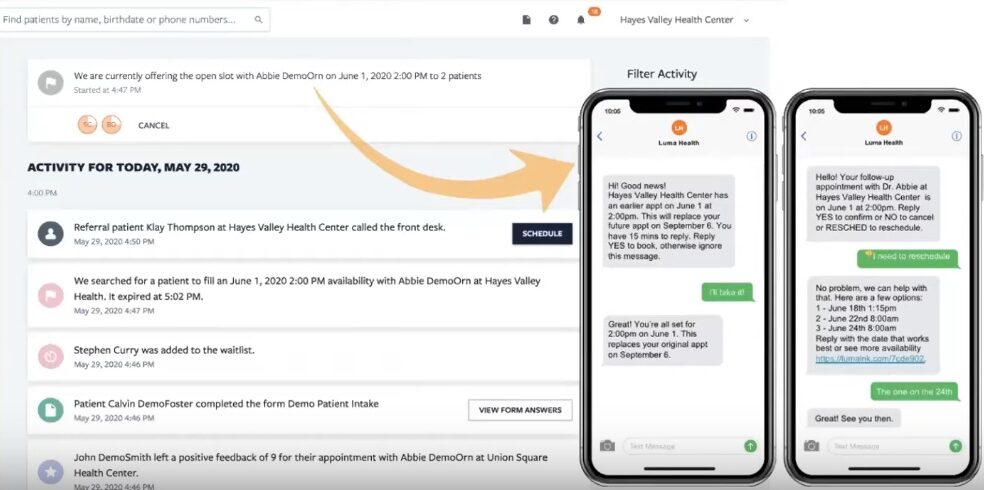
Luma Health’s platform automates scheduling and referrals via text message. Screenshot from MedCity Invest
Often, a painful experience will spur founders to start a new company.
For Luma Health CEO Adnan Iqbal, it was tearing his ACL during a soccer match. He was told that he would have to wait three weeks before he could even get in for an appointment. But after calling in several times, he was able to get in and get to surgery within that week.

Luma Health CEO Adnan Iqbal
He relayed his experience over lunch to his friend and co-founder, who was finishing a radiology fellowship at Stanford. He, too, was facing scheduling problems.
“Patients were waiting five to 10 weeks to see him when he had eight to 10 openings on his calendar,” Iqbal said in a phone interview.
The idea was to create a simple fix to this broken system. Not only would it make for happier patients, but it could also boost health systems, which face unused capacity on a given day.

A Deep-dive Into Specialty Pharma
A specialty drug is a class of prescription medications used to treat complex, chronic or rare medical conditions. Although this classification was originally intended to define the treatment of rare, also termed “orphan” diseases, affecting fewer than 200,000 people in the US, more recently, specialty drugs have emerged as the cornerstone of treatment for chronic and complex diseases such as cancer, autoimmune conditions, diabetes, hepatitis C, and HIV/AIDS.
For most appointments, patients call in, and are told a physician won’t be available for another month or two. Assuming the doctor is busy, patients hurriedly make an appointment. But they’re unlikely to keep it.
“Any patient that schedules more than two weeks in the future is at a high risk of disappearing. Their schedule changes, life changes, they forget to cancel or they’re a no-show,” Iqbal said. “Within a 48-hour window there are such constant changes to a hospital’s schedule and a lot of people fall through the cracks, unfortunately.”
This leaves call centers trying to contact patients to fill last-minute openings, but with mixed results.
Luma’s approach is to send automated text messages to patients that allow them to schedule or confirm a visit just by clicking a link. For example, it can let patients know they’re due for their annual well visit, or that they were referred by their primary care physician for a colonoscopy. Patients receive reminders the day before, including instructions, such as having someone to drive them in for their procedure.
After the visit, it follows up with questions, such as whether the patient is feeling nauseous or light-headed, that can lead to a video visit if needed.
Iqbal said the company sees referrals upwards of 60%, where normally just 15% to 30% of patients follow through with a referral.
The company has been around for five years now, and 16 million patients use its platform. In the last year, the company started to see growing interest in patient engagement platforms, as health systems began to think more about their “digital front door.”
The Covid-19 pandemic only further magnified that, as clinics needed a way to route patients to the right point of care – and fast.
“We started seeing that pull in 2019. Once the pandemic hit, it really accelerated that transformation. It went from a top-five priority to a must-have,” Iqbal said. “It’s been all hands on deck”
The company worked with UC San Diego Health to implement its platform in just eight days. They needed to be able to message a quarter of a million patients on which locations to go to and what services were available.
Luma’s other clients include UCSF Health, public health system Cook County Health and Salud Family Health Centers, a federally qualified health center in Colorado.
In the future, Iqbal hopes to deepen Luma’s work on the clinical side and help stratify patient risk.
“How can we guide them further in the journey than we are able to today?” he said.













